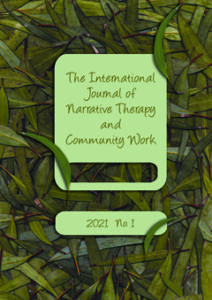2021: Issue 1

Dear reader,
As the international community of narrative practitioners continues to respond to the COVID-19 pandemic in diverse ways, this issue of the journal consists of four profoundly different papers each responding to local social issues and each representing their own form of political practice.
Shelja Sen, in Delhi, India, describes the ‘Just Girls’ conversations she has shared with young women in relation to resistance, social justice and mental health. During the COVID-19 pandemic, Shelja’s work with young women who were dealing with experiences of trauma, gender-based violence and pressure to conform to patriarchal definitions of success took the form of a journey metaphor that could be used across age, class, language and culture. In this paper, Shelja shares stories of two young women illustrate how conversations that start in the therapy space can create ripples in our sociocultural and political contexts.
The second paper in this issue is by Chaste Uwihoreye who is a clinical psychologist, narrative practitioner and country director of Uyisenga Ni Imanzi, a child and youth–focused organisation in Rwanda. This paper represents a resource to assist Rwandans to deal with hardships and pain that may not be visible to the eye but that is real, and often experienced physically, especially by those who survived the 1994 Genocide in Rwanda. It includes a series of narrative exercises and stories of face-to-face conversations and text exchanges in the hope that it will be helpful to the general public in Rwanda as well as to counsellors and therapists. Many of the stories of practice included in this paper were conducted during the COVID-19 lockdown of 2020, and these conversations had to be held by whatever means was possible – text messages, WhatsApp messages, Zoom calls, and others – and often a mixture of them.
The third paper, Seeing the forest for the trees: Exploring the forest aspect of the Tree of Life process to sustain and nourish socioecological activism is by Australian practitioner, Elizabeth Nichols. By expanding the ‘forest’ section of the Tree of Life metaphoric narrative practice to include collective consideration of mycelium, possibilities were opened to exploring ‘underground’ networks of care and support, including those that might not be seen or recognised by the dominant culture. Exploring the role of hub trees in a forest system enabled conversations about the contributions of elders in a community. Considering forests as place sparked discussion of the contributions of place and the more-than-human world in our lives. The Tree of Life metaphor was modified in this way in the context of a co-research project seeking to elicit the insider knowledge of long-term activists about sustaining activism addressing ecological and social justice issues, particularly climate change.
The final paper, Moving beyond the single story: using a double-storied assessment tool in narrative practice by Jake Peterson explores the danger of a single story in traditional mental health assessments, and presents an alternative assessment tool that seeks to contribute to rich story development while satisfying organisational requirements. Since the start of the COVID-19 pandemic, demand for counselling eclipsed capacity in Jake’s organisation. Those seeking counselling would routinely experience single-storied (problem-focused) assessment but then be placed on a waitlist for months. In response to this ethical dilemma, Jake has created alternative ‘assessment’ processes which we hope will be helpful to many other practitioners who face similar challenges.
These four papers represent significant narrative responses to local social issues during the COVID-19 pandemic.
We look forward to your feedback.
And we wish you, your families, friends and communities good health in these extraordinary times.
Warmly,
Cheryl
